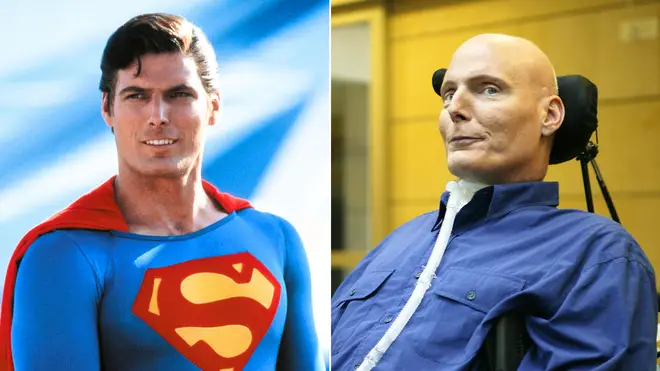How Christopher Reeve turned tragedy into triumph: Superman actor's accident explained
10 June 2024, 15:36 | Updated: 10 June 2024, 16:10

Christopher Reeve’s life took a dramatic turn on May 27, 1995, when a tragic accident left him paralyzed from the neck down.
Listen to this article
Before his tragic accident, Christopher Reeve enjoyed a thriving career in the entertainment industry, best known for his role as Superman in the late 1970s and 1980s.
Born on September 25, 1952, Reeve trained at Juilliard and quickly gained acclaim for his stage performances. His portrayal of the Man of Steel in Superman (1978) and its sequels catapulted him to international fame.
Beyond his superhero persona, Reeve demonstrated his acting versatility in films like Somewhere in Time (1980) and The Remains of the Day (1993), and he earned critical praise for his work in theatre and TV.
Reeve, an accomplished equestrian, was competing in an event at the Commonwealth Dressage and Combined Training Association in Culpeper, Virginia. While attempting a jump with his horse, Eastern Express, the horse unexpectedly stopped short before the fence. This sudden halt caused Reeve to be thrown forward off the horse.

Reeve landed headfirst, with his hands tangled in the reins, which contributed to a forceful and awkward fall. The impact resulted in a cervical spinal cord injury, specifically at the C1 and C2 vertebrae, which are located near the base of the skull. This injury left him paralyzed from the neck down and dependent on a ventilator to breathe.
The fall resulted in a cervical spinal cord injury, which left him quadriplegic. This life-altering event marked a significant shift in Reeve's life, but instead of retreating into despair, he used his experience to become an advocate for disability rights and medical research.
So many of our dreams at first seem impossible, then they seem improbable, and then, when we summon the will, they soon become inevitable.
In the immediate aftermath of his accident, Reeve faced immense physical and emotional challenges. The injury required him to undergo several surgeries and intense rehabilitation. His condition necessitated the use of a ventilator to breathe, and he had to come to terms with the loss of mobility and independence.

Despite these challenges, Reeve demonstrated remarkable resilience and determination. His wife, Dana Reeve, became his steadfast supporter, helping him navigate this new reality.
Reeve's journey towards advocacy began with his own fight for recovery and better treatment options. Frustrated by the limitations of existing medical research and therapies, he became a vocal proponent for advancements in spinal cord injury research.
I'm not living the life I thought I would lead, but it does have meaning, purpose. There is love... there is joy... there is laughter.
He believed that with adequate funding and scientific dedication, significant progress could be made in finding a cure for paralysis. This belief led him to establish the Christopher Reeve Foundation in 1998, which later became the Christopher & Dana Reeve Foundation after Dana's passing in 2006. The foundation's mission was to fund research for spinal cord injuries and improve the quality of life for individuals living with paralysis.
Reeve's advocacy extended beyond medical research. He became a powerful voice for disability rights, using his celebrity status to bring attention to the issues faced by people with disabilities.

He worked tirelessly to promote accessibility and inclusion, advocating for changes in public policy and societal attitudes. His efforts contributed to increased awareness and better support for those living with disabilities.
In addition to his advocacy work, Reeve made a remarkable return to his career in the entertainment industry. Despite his physical limitations, he directed the critically acclaimed television film In the Gloaming in 1997. The film, which starred Glenn Close and Bridget Fonda, received four Emmy nominations and showcased Reeve's talent behind the camera.
His ability to continue working in the industry he loved served as an inspiration to many, proving that creativity and passion can transcend physical limitations.
Reeve also authored two autobiographical books, Still Me (1998) and Nothing is Impossible: Reflections on a New Life (2002). In these works, he shared his personal journey, the challenges he faced, and his unwavering belief in the potential for medical breakthroughs. His writing offered hope and encouragement to others facing similar struggles, and his candid reflections on his life resonated with readers worldwide.
One of Reeve's most significant public moments came in 2000, when he made a surprise appearance at the Academy Awards. He delivered a powerful speech advocating for the inclusion of people with disabilities in all aspects of life, including the film industry. His presence on that stage, in front of millions of viewers, was a poignant reminder of his resilience and determination to make a difference.

Reeve's impact was not limited to his own foundation and advocacy work. He also collaborated with other organizations and researchers to push for advancements in spinal cord injury treatment.
His influence helped secure funding for research and fostered collaborations between scientists, medical professionals, and advocates. Through his efforts, significant strides were made in understanding spinal cord injuries and exploring potential treatments.
A hero is an ordinary individual who finds the strength to persevere and endure in spite of overwhelming obstacles.
Despite his declining health, Reeve remained active in his advocacy until his death on October 10, 2004, at the age of 52. His legacy continues to inspire and drive progress in the fields of medical research and disability rights.
The Christopher & Dana Reeve Foundation remains a leading force in the fight against paralysis, funding cutting-edge research and supporting individuals and families affected by spinal cord injuries.
Christopher Reeve's life after his tragic accident is a testament to the power of resilience, determination, and advocacy. He transformed his personal tragedy into a platform for change, using his voice and influence to champion the rights of people with disabilities and push for scientific advancements.
His legacy serves as a beacon of hope, reminding us all that even in the face of overwhelming adversity, it is possible to make a profound and lasting impact on the world.





















